Discover the top heated driveway systems of 2025, offering innovative solutions for snow and ice removal.
This guide highlights key features, advantages, and costs of various types including electric, hydronic, and above-ground systems, simplifying your decision for an efficient, safe winter solution.
Our Top 3 Picks
- Electric Cable Heated Driveway System – Best for homeowners seeking efficient and reliable snow melting with individual zone control.
- Electric Driveway Snow Melting Mats – Best for homeowners looking for a hassle-free snow and ice removal solution that’s easy to install.
- Above Ground Melting Mats – Best for homeowners wanting a convenient and portable snow melting solution.
Types of Heated Driveway
When it comes to heated driveways, there are three main types to consider: electric, hydronic, and above ground systems.
Each type offers distinct advantages and can be powered by various sources.
Electric Heated Driveways
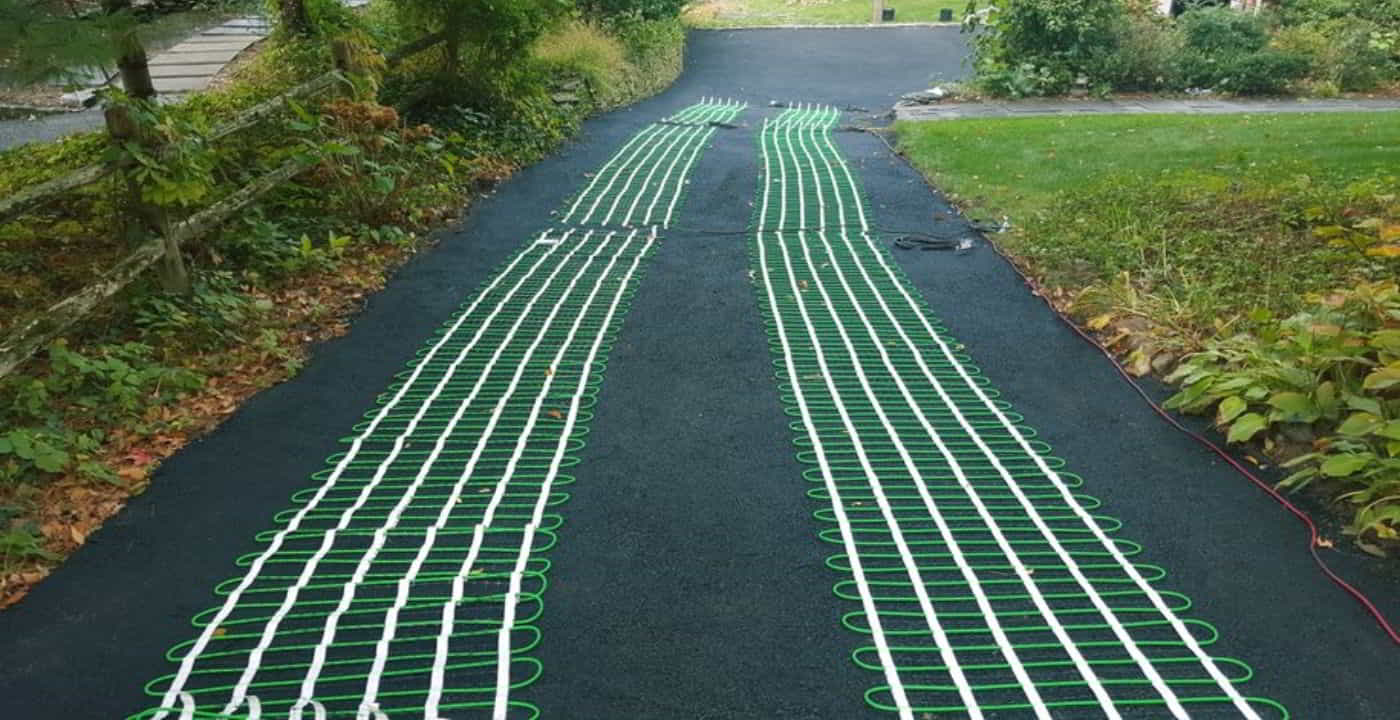
Electric heated driveways utilize heating elements like cables or mats installed beneath your driveway’s surface.
These systems are versatile and compatible with various driveway materials such as asphalt and concrete. Electric systems are relatively easy to retrofit into existing driveways.
Power Sources: These systems can be powered by standard electrical sources, wind turbines, generators, or solar energy, making them a convenient choice for most homeowners.
Pros:
- Easy and cost-effective installation.
- Quick heat-up times with zone control for targeted heating.
- Minimal maintenance required.
- Equipped with safety sensors to prevent overheating.
- Reliable and efficient snow melting.
Cons:
- Operational costs may vary with electricity rates.
- May not be as cost-effective for large driveways.
- Components can degrade over time with exposure to moisture and wear.
Pricing: Pricing for electric heated driveway systems can range from $12 to $30 per square foot, depending on the specific product and installation requirements.
Hydronic Heated Driveways
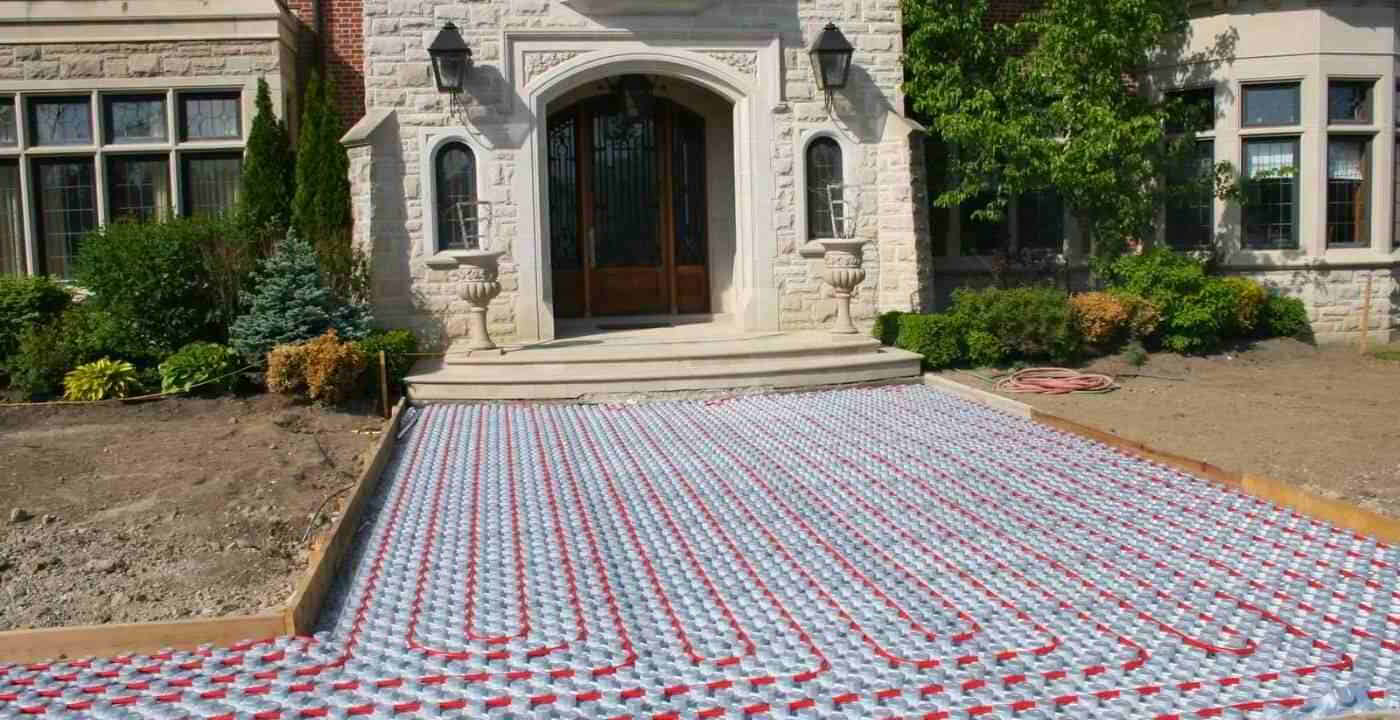
Hydronic heated driveways rely on a system of water and antifreeze mixture that is heated in a boiler and circulated through tubing installed beneath the driveway surface.
They are often more complex to install than electric systems but offer long-term energy efficiency.
Power Sources: These systems can be powered by various energy sources, including gas, electricity, or even solar power.
Pros:
- Effective and cost-efficient for larger driveways.
- Flexible energy source options.
- Uniform heating across the driveway.
- Energy-efficient and environmentally friendly.
- Durable and reliable snow melting.
Cons:
- Initial setup costs can be high.
- Requires regular maintenance, including boiler checks.
- Installation can be intricate.
- Tubing may degrade over time.
Pricing: Pricing for hydronic heated driveway systems typically ranges from $14 to $30 per square foot, depending on factors like the energy source and complexity of the installation.
Above Ground Heated Driveways

Above ground heated driveway systems, such as electric snow melting mats, are designed to be placed on top of your driveway surface.
They are suitable for both residential and commercial properties and provide a portable solution for snow and ice removal.
Power Sources: These systems can be simply plugged into outdoor outlets for operation.
Pros:
- Easy installation and portability.
- Minimizes freeze-thaw cycles and reduces deicing chemicals.
- Cost-effective alternative to underground systems.
- Suitable for various outdoor spaces.
Cons:
- May not provide as uniform heating as in-ground systems.
- Limited to melting up to a certain depth of snow.
- Requires an outdoor outlet for operation.
Pricing: Pricing for above ground heated driveway systems varies depending on the specific product and size but is generally more affordable than in-ground systems.
Best Heated Driveway
Now we’ve explored the types of heated driveway, let’s take a look at some of the best options on the market.
Our top 6 are as follows:
1. Electric Driveway Snow Melting Mats

Our underfloor electric heating mats are a practical solution for homeowners seeking efficient snow and ice removal from their driveway, preventing accidents and damage to the driveway itself.
The mats are designed for easy retrofitting onto existing driveway surfaces, including asphalt and concrete.
The installation process is straightforward—simply lay the mats evenly beneath the surface material and connect them to a power source and control system.
Once activated, these mats provide consistent and reliable snow melting, eliminating the need for manual snow removal or costly snow removal services.
Preventing snow and ice accumulation contributes to a safer environment for both pedestrians and vehicles while protecting your driveway from damage caused by freezing and thawing cycles.
Best for: Homeowners looking for a hassle-free snow and ice removal solution that’s easy to install.
Pros:
- Quick and straightforward installation.
- Prevents accidents and driveway damage.
- Reduces the need for snow removal services.
- Cost-effective snow melting.
Cons:
- Limited customization.
- Higher upfront cost compared to some other options.
Pricing: Prices for our electric mats will vary depending on the size of your driveway but start from $12 per square foot.
Rating:
Reasoning: Offers easy installation, efficient snow melting, and is suitable for various surfaces whilst being one of the cheapest options available. Excellent value and performance.
2. Electric Cable Heated Driveway System

An Electric Heated Driveway System offers a versatile, highly efficient solution for homeowners wanting to keep their driveways clear of snow and ice.
With super speedy and impressive heat up times, users of this system will also benefit from individual zone control, allowing specific areas to be targeted for heating.
We provide a straightforward, no frills installation process, with this system being suited to driveways of various size and layout.
Additionally, these systems are designed with safety in mind, featuring built-in sensors to prevent overheating and potential damage.
They provide reliable and consistent snow melting, ensuring that your driveway remains accessible and safe during winter months.
Best for: Homeowners seeking efficient and reliable snow melting with individual zone control.
Pros:
- Easy installation.
- Zone control for targeted heating.
- Low maintenance.
- Consistent snow melting.
Cons:
- Operational costs may vary.
- Not always as cost-effective for very large driveways.
Pricing: Pricing for our electric cable systems typically range from $480.
Rating:
Reasoning: Highly efficient, comes with zone control, excellent snow melting and ice build up prevention and will last for years with little to no maintenance.
3. Thermo Soft Electric Cables
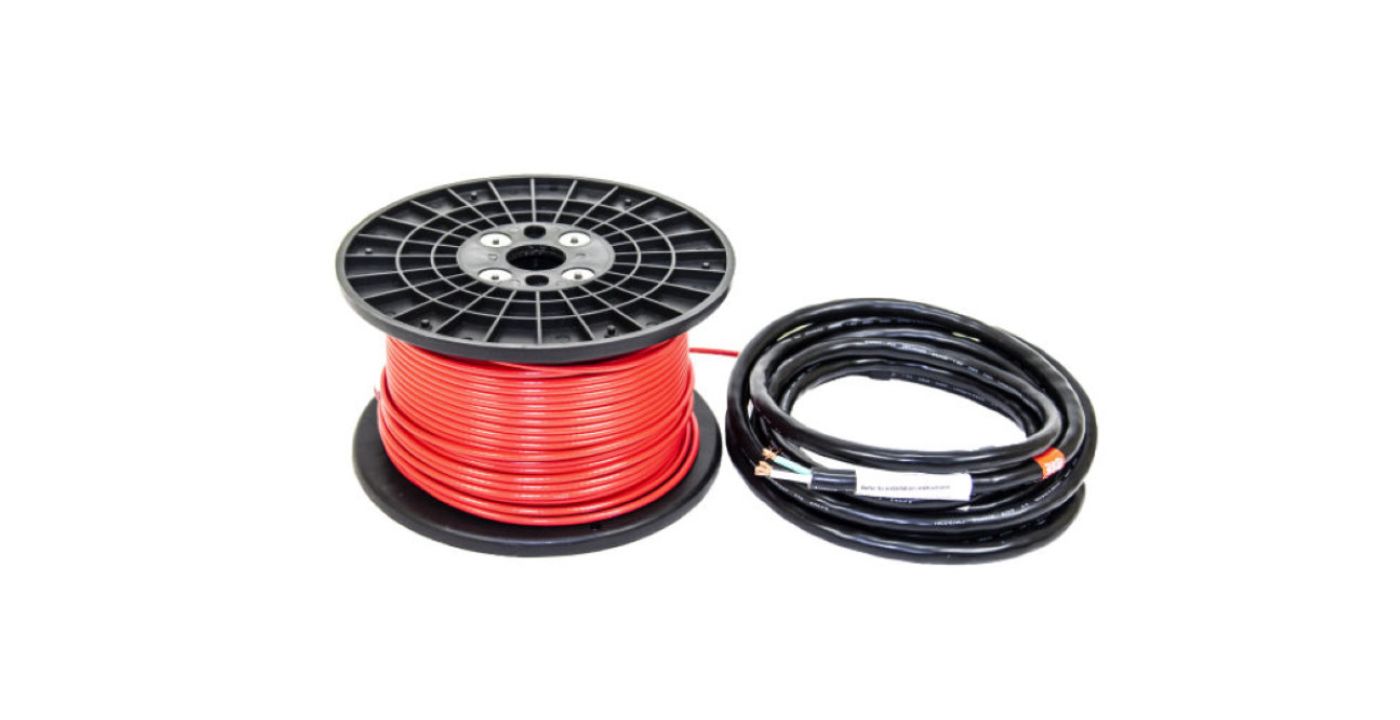
Thermo Soft’s NeverFreeze snow melting cable is a robust and reliable solution for homeowners who require consistent snow melting, especially in high-traffic areas.
This system is engineered for installation in concrete, asphalt, or beneath pavers, making it suitable for various outdoor applications.
Designed for both residential and commercial use, the system features a single cold lead wire for easy hookup.
Thermo Soft’s proven controls and outdoor-rated ground sensors ensure efficient snow melting, preventing slippery and hazardous conditions on walkways and steps.
With this system, you can enjoy peace of mind during winter, knowing that snow removal is taken care of.
Best for: High-traffic areas that require consistent snow melting.
Pros:
- Suitable for various surfaces.
- Residential and commercial applications.
- Easy installation with a single cold lead wire.
- Proven controls and ground sensors.
Cons:
- Limited to specific outdoor applications.
- Requires a dedicated electrical connection.
Pricing: Pricing for Thermo Soft Electric Cables depends on the installation requirements but typically ranges from $11 to $15 per square foot.
Rating:
Reasoning: Excellent for high-traffic areas and various surfaces, but limited to specific applications and requires a dedicated electrical connection.
4. Ampex Insulated PEX Panel
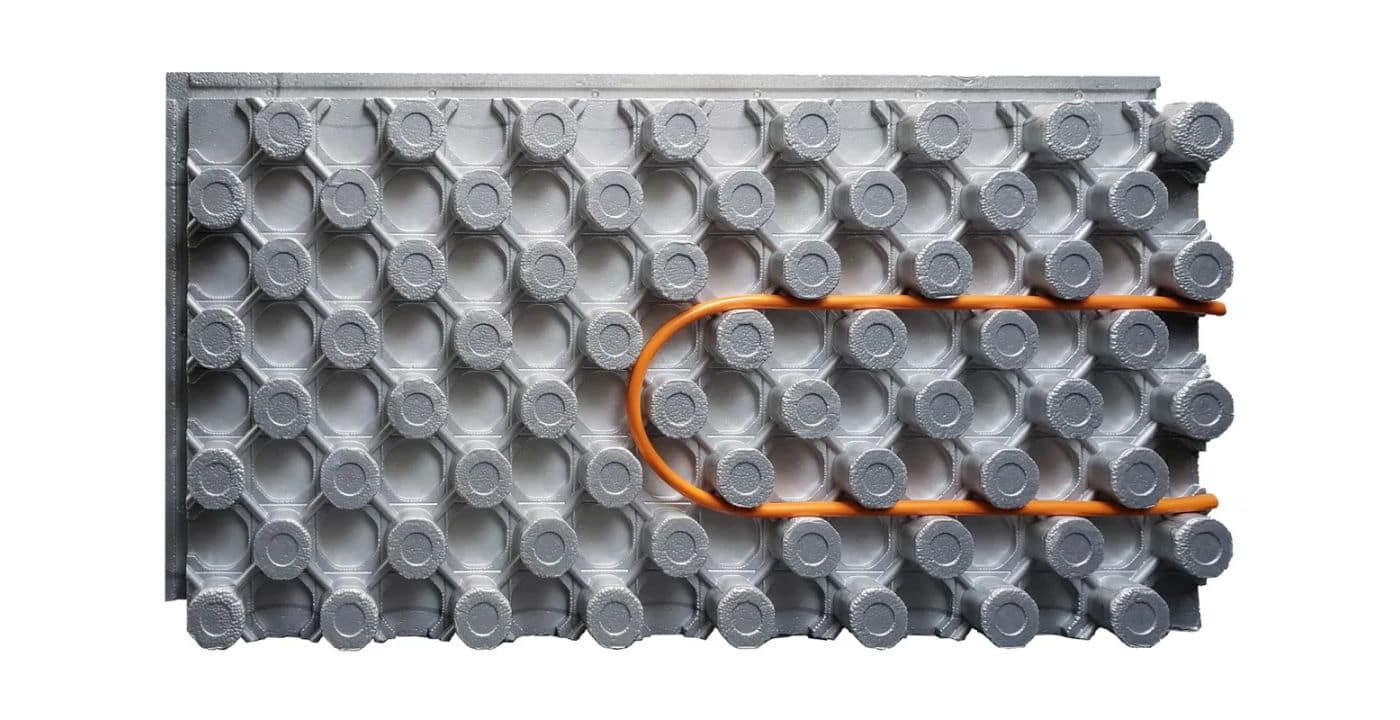
Offering a high performance hydronic, radiant heating solution, the Ampex Insulated PEX Panel system is specifically designed for outdoor snow melting on driveways and walkways.
Compatible only with concrete surfacing, it provides exceptional durability whilst eliminating slippery ice conditions.
The insulation within the panels limits downward heat flow, optimizing energy efficiency.
Ampex’s innovative panel design ensures that the tubing is fully encased in concrete, promoting faster heat transfer and reducing the response time of the system, resulting in a driveway that remains snow-free and safe throughout the winter.
Winter maintenance becomes practically effortless, enhancing comfort and convenience for homeowners.
Best for: Homeowners with concrete driveways.
Pros:
- Efficient energy use with insulation.
- Durable and safe solution.
- Innovative panel design for even heating.
- Tubing firmly encased in concrete.
Cons:
- Initial setup can be costly.
- Regular maintenance required.
- Specific to concrete driveways.
Pricing: Pricing for Ampex Insulated PEX Panel systems ranges from around $18 to $30 per square foot.
Rating:
Reasoning: Energy-efficient with an innovative design, but the price is on the high side compared to similar products and this can only be used with concrete driveways.
5. Above Ground Melting Mats
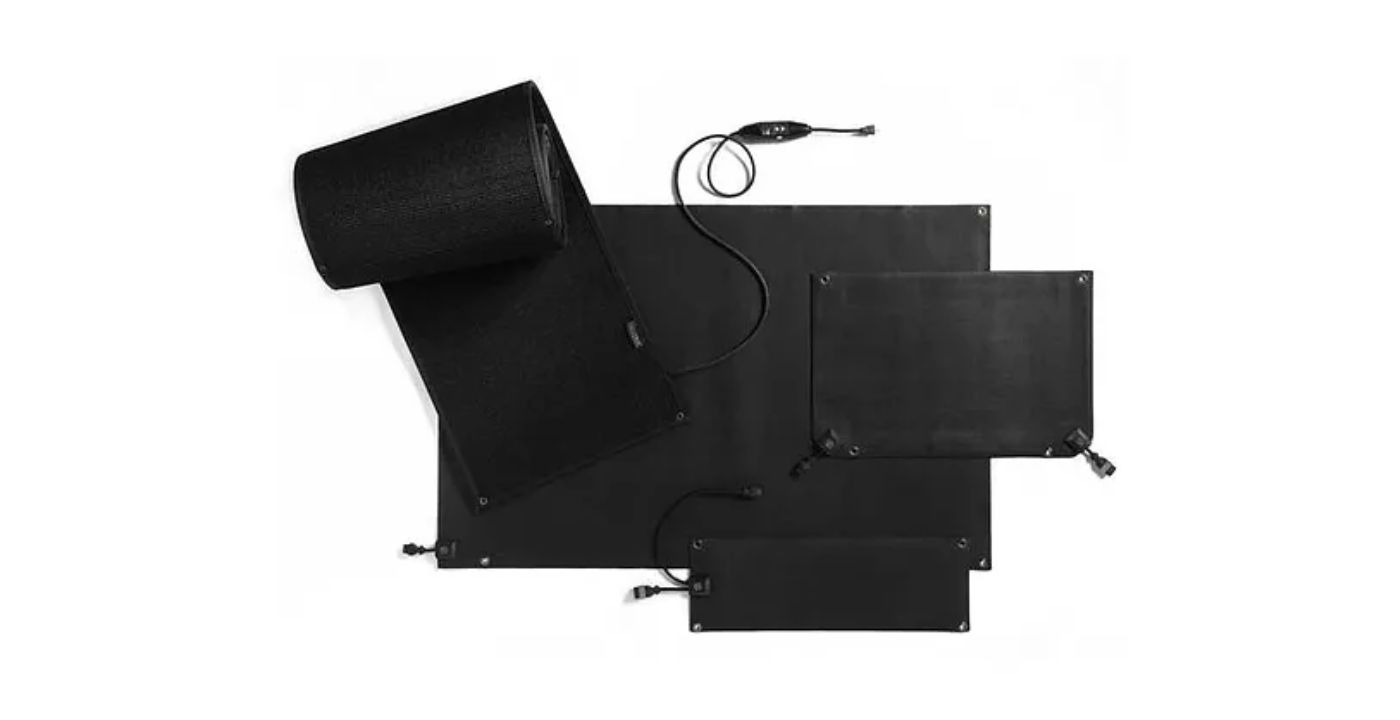
Our above ground Melting Mats offer a convenient and portable solution for snow and ice removal, making them suitable for both residential and commercial properties.
These mats are designed to be placed on top of existing driveway surfaces, providing an alternative to traditional in-ground systems.
Simply plug these mats into an outdoor outlet and watch as much as 2 inches of snow every hour just melt away, minimizing freeze-thaw cycles and reducing the use of deicing chemicals
These mats can help to extend the lifespan of your exterior surfaces but also ensure hassle-free snow removal.
Whether you need to keep your stairs, landings, entries, driveways, or ramps clear of snow and ice, these mats offer a practical and cost-effective solution.
Best for: Homeowners wanting a convenient and portable snow melting solution.
Pros:
- Plug-and-play design.
- Minimizes freeze-thaw cycles and chemical use.
- Durable and reusable.
- Suitable for various outdoor areas.
Cons:
- May not provide as uniform heating as in-ground systems.
- Limited to a certain depth of snow melting.
- Requires an outdoor outlet.
Pricing: Prices start from $79.99 for a 10”x 30” stair mat.
Rating:
Reasoning: Offers convenience and portability with a plug-and-play design, convenience and performance and a great price point
6. Alco Electric Heating Mats

Another choice designed to be laid straight down onto the driveway, these Alco Electric Heating Mats are a premium choice that offer hassle-free solutions to maintaining a snow free driveway throughout the winter season.
With an easy, do-it-yourself installation process, these mats will eliminate the need for manual snow shoveling; simply plug into a standard 120v outlet and they’re ready to go.
Suitable for sloped and steep driveways, these mats will work to clear even the most hazardous of areas by efficiently melting the snow, evaporating the water, and leaving your driveway safe, accessible and snow free.
Best for: Homeowners looking for a do-it-yourself snow melting solution at a premium price point.
Pros:
- Easy DIY installation.
- Suitable for sloped and steep driveways.
- Efficient snow melting.
- Waterproof and weatherproof.
Cons:
- Requires a standard 120V outlet.
- May not be as energy-efficient as some other options.
- More costly than other brands
Pricing: A 24”x 20” mat is $1920.
Rating:
Reasoning: Easy DIY installation and suitable for challenging driveways, but it’s much more expensive, is only available with a 120V outlet option, and is not as energy-efficient as other options.
Choosing the Best Heated Driveway
Selecting the ideal heated driveway system is a critical decision that depends on various factors. To make an informed choice, consider the following essential factors:
Climate Consideration
Tip: Always assess your climate before choosing a heated driveway system. Opt for a robust system if you experience heavy snowfall, and a basic one for milder areas to save on costs.
The severity of winter weather in your region should be the foremost consideration when choosing a heated driveway system.
In areas prone to heavy snowfall and freezing temperatures, a more robust and powerful system is essential to manage snow and ice removal efficiently.
Regions with milder winters may find a basic system sufficient to meet their needs. Conduct a thorough assessment of your local climate and the typical winter conditions.
Material Compatibility
The type of driveway material you have—whether it’s asphalt, concrete, or pavers—plays a crucial role in selecting the right heating system.
Not all systems are compatible with every material.
Compatibility ensures even heat distribution, durability, and the prevention of damage to your driveway surface.
System Type
Decide between electric and hydronic heated driveway systems based on several factors, including efficiency, installation costs, and maintenance requirements.
Electric systems are known for their ease of installation and cost effective nature, while hydronic systems can work well for larger driveways.
Energy Efficiency
Consider the long-term energy efficiency of your chosen heated driveway system.
Opt for systems equipped with energy-efficient features that can help you save on utility bills over time.
Features such as zoning, which allows you to heat specific areas selectively, can further enhance energy efficiency.
Heated Driveway Electric vs Hydronic Summary
When it comes to heated driveway systems, the decision often boils down to choosing between electric and hydronic options, each offering its unique advantages and considerations.
Whilst electric heated driveway systems may cost more initially to operate, when powered from the grid, they are also on demand.
Hydronic systems may operate at a lower BTU/gal but will constantly consume energy to ensure that there is hot water when required
This means more money and more energy being consumed, and this will still be the case even if you had an automated hydronic heated driveway.
Whatever your priorities, preferences, or needs, our handy comparison table below will help you make an informed choice tailored to meet your exact requirements.
| Driveway System | Energy-Efficient | Cost-Effective for Large Driveways | Quick Setup | Eco-Friendly | Energy-Saving | Customizable Patterns | Even Heat Distribution | Minimal Maintenance |
|---|---|---|---|---|---|---|---|---|
| Electric Coil | ||||||||
| Electric Mat | ||||||||
| Hydronic |
What is the Best Surface for a Heated Driveway?
When considering a heated driveway, it’s crucial to contemplate the compatibility of radiant heating systems with various driveway surfaces.
Radiant heating systems are versatile and can be installed under different surfaces, including concrete, asphalt, and pavers.
Let’s take a closer look at the options to help you decide:
Concrete Driveways
Concrete driveways are a popular choice for heated driveways.
They work seamlessly with various heating systems, including electric coil and hydronic systems.
The dense nature of concrete ensures efficient heat transfer, making it an ideal surface for keeping your driveway free from snow and ice.
Additionally, concrete driveways offer long-lasting durability and can be customized to complement your home’s aesthetic.
Asphalt Driveways
Asphalt driveways are not only budget-friendly but also compatible with radiant heating systems.
They are particularly well-suited for electric coil systems.
The dark color of asphalt helps in heat absorption, allowing for effective snow and ice melting, however, it’s important to note that asphalt driveways may require more maintenance over time compared to concrete.
Paver Driveways
Paver driveways offer both compatibility with heating systems and a wide range of design options.
They work well with electric coil systems, which can be customized to fit the layout of the pavers.
While paver driveways provide an aesthetically pleasing look, it’s essential to consider that installation can be labor-intensive, and individual pavers may need adjustment to ensure even heat distribution.
Brick Driveways
Brick driveways are compatible with radiant heating systems, especially electric coil setups.
Their classic appearance enhances your home’s curb appeal while ensuring efficient snow and ice melting.
Gravel Driveways
While less common, it is possible to install heated driveways beneath gravel surfaces using specialized heating systems designed for this purpose.
Gravel driveways offer a unique and rustic aesthetic.
Custom Surfaces
Custom surfaces like decorative or stamped concrete can add a unique touch to your heated driveway.
These surfaces are compatible with various heating systems, but it’s essential to consult with an expert to ensure the chosen design and material align with the specific heating system requirements.
How Much Does a Heated Driveway Cost?
Understanding the cost of a heated driveway system is a crucial aspect of planning for enhanced convenience and safety during winter months.
Costs can vary depending on several factors, including the type of system, the size of your driveway, and specific installation requirements.
Here’s a look at the average cost:
| Driveway System | Average Cost |
|---|---|
| Electric Coil | $12-$21 per square foot |
| Hydronic | $14-$24 per square foot |
| Electric Mat | $15-$22 per square foot |
| Solar-Integrated | $20-$30 per square foot (includes solar infrastructure) |
What to Avoid With Heated Driveways
Skimping on Installation
When it comes to installing a heated driveway system, it’s crucial not to cut corners or attempt a DIY approach.
Trusting only certified professionals is essential. They possess the expertise needed to select the right system, assess your property’s specific requirements, and ensure the installation is carried out correctly.
Skimping on installation can lead to inefficiencies, increased operating costs, and even safety hazards.
Ignoring Regular Maintenance
Maintaining your heated driveway system is paramount, particularly for hydronic systems.
Neglecting regular maintenance can result in decreased performance, system breakdowns, and higher long-term expenses.
Create a maintenance schedule and stick to it. For hydronic systems, this includes periodic checks on the boiler, pumps, and tubing.
Electric systems may require inspections for cable integrity. Consistent upkeep guarantees the system’s reliability and longevity.
Mismatching Driveway Material
Not all heated driveway systems are compatible with every type of driveway material. Mismatching the system with your driveway material can lead to uneven heating, reduced efficiency, and potential damage.
Consulting with a professional is essential to determine the compatibility of your chosen system with your driveway material.
Hydronic systems, for example, are often better suited for concrete driveways, while electric systems perform well with asphalt or pavers.
Frequently Asked Questions
How long do these systems last?
With proper maintenance and care, heated driveway systems can have a lifespan of 15 to 20 years.
Regular maintenance, such as checking for cable or tubing integrity, ensuring the system’s electrical components are functioning optimally, and addressing any potential issues promptly, can significantly extend the system’s longevity.
Do they work during heavy snowfall?
Yes, heated driveway systems are designed to be effective even during heavy snowfall.
The key to their performance lies in proper calibration for your region’s specific snowfall and temperature patterns.
These systems are typically equipped with controls that allow you to adjust their settings to match the severity of the weather.
Is it eco-friendly?
The eco-friendliness of heated driveway systems can vary depending on the type you choose.
Solar-integrated systems are the most environmentally friendly option. They harness solar energy during the day and use stored energy to heat driveways during snowfall, reducing their reliance on traditional power sources.
On the other hand, other heated driveway systems, such as electric, can be made more efficient and environmentally conscious through the use of smart controls.
These controls allow you to optimize the system’s operation, reducing energy consumption and, by extension, its environmental impact.
Conclusion
In today’s age, having the best heated driveway system is not just about luxury, but also about safety and convenience.
Investing in a good system can save you from the hassles of manual snow removal, potential accidents, and can even extend the life of your driveway.
Whether you own a large home or seek energy efficiency, there’s an option tailored just for you. Remember, it’s not just about the upfront cost, but the long-term benefits that a heated driveway promises.
We offer easy and convenient ways to melt away the snow every winter. Start your journey to a heated driveway system today with a free, no-obligation quote.





